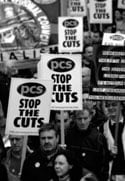This document is a statement on Britain, an analysis which was agreed
unanimously at the national conference of Socialist Appeal in April.
The statement constitutes an analysis of the deepening social,
political and economic crisis of British capitalism. This perspective
applies the method of Marxism to these developments, seeking to uncover
the trends and processes within, and serves as a guide to action for
all those workers and youth who want to struggle for a socialist
transformation of society.
The Outcome of Blairism
The Blair government has served
capitalism well. However, after ten years in office, profound disillusionment
has set in with Labour’s record. Abstentions in elections, especially in
working class areas, have increased enormously. After three general election
victories for Blair, the varnish is wearing thin on the New Labour government.
The rotten stench of sleaze and corruption threatens to engulf the Blair
government in much the same way as it engulfed previous Tory administrations.
This is an inevitable outcome of 10 years of Blairism, keen to cultivate its
big business friends with promises of peerages. More than 55 per cent of people
now characterize the government as "very sleazy and disreputable",
according to a YouGov poll. In the same survey, 64 per cent said they believe
Labour "probably" did offer honours to wealthy businessmen who
promised large loans or donations. Despite all the denials, most people no
longer believe them.
Blair is expected to announce his
resignation from office soon. The final phase of his premiership is proving to
be tortuous. Pressures are mounting that he should leave immediately as these
last months are turning into a disaster for the Labour Party with local, Scottish
and Welsh elections due in May. The whole thing is threatening to unravel as
MPs look to their careers put at risk by this fiasco. Ever more voices are
heard calling for Blair’s early departure. Even Neil Kinnock has been wheeled
out to urge Blair to stand down, but to no avail.
The middle class carpetbagger
Blair has no interest in the fate of the Labour Party. He feels no loyalty to
it. And he has become an electoral liability, as Thatcher was for the Tories in
1990. These wrecking tactics suit the Tories and Big Business very well.
Although Blair served them faithfully, the bourgeois will never be reconciled
to the Labour Party as long as it retains its links to the trade unions. Their
attitude is, as always, "use and discredit." As soon as New Labour shows it is
no longer able to keep the unions and the rank and file under control, the
bourgeois will pounce on it and use the mass media to hound it from office,
making use of the scandals and corruption of the leaders, about which they have
known quite a lot for some time.
The end of Blair marks a turning
point. There is ferment in British society. There is profound discontent in the
working class and also in the middle class, betrayed and sickened by ten years
of the broken promises and "reforms" they did not want. A Mori poll found
roughly equal numbers of voters ‑ 68 and 69 per cent ‑ expressing
dissatisfaction with the prime minister and the government. This is the reason
for the low turnout at elections. However, the departure of Blair will not
signify a fundamental change in policy. Blair personifies a decade of
pro-capitalist policies, which Brown has pledged to maintain. Under present
conditions this is a finished recipe for a crisis in the Labour Party.
 The natural party of the ruling
The natural party of the ruling
class remains the Conservative Party. In recent opinion polls, the Tories are
seen as having better policies for the economy and the NHS than Labour. But
they still have a problem, inasmuch as New Labour has stolen their clothes. The
attempt by Cameron to improve the Tories’ image by moving closer to New Labour
will not necessarily help to win over Labour voters and may lose him the votes
of traditional Tory supporters. Nevertheless, the Tories can return to power at
a certain stage on the basis of a collapse of Labour’s electoral support and
massive Labour abstentions.
While the Tories have gone from
one crisis to another, they are now being given favourable press by the
bourgeois media. Cameron is attempting to refurbish their image and re-position
the party, even cynically adopting green policies and indulging in criticisms
of big business. To stand any chance of winning the next election – although
the Tories are already ahead in the opinion polls ‑ they must reinvent
themselves. Their shift to the "centre" ground has won back a layer that voted
Liberal Democrat. Their hope is that Labour voters will stay at home and
traditional Tory voters will turn out to vote.
In Scotland and Wales
In May, the local elections, as
well as the election for the Scottish Parliament and the Welsh Assembly, will
confirm this disillusionment with New Labour. Given a low turnout, Labour is
widely tipped to lose between two and five assembly seats this May in the Welsh
Assembly. Rhodri Morgan, the Assembly leader, is desperately trying to distance
himself from the unpopularity of Blair. But he is not certain to succeed.
Nevertheless, Welsh Labour will still be the biggest party, but without the
majority, it will again turn to coalition to run the Assembly. Since Labour has
publicly rejected forming a coalition with the Conservatives, a return to
coalition with the Liberal Democrats (as happened in Wales from 2000 to 2003)
looks most likely, although Plaid Cymru’s deputy assembly leader, Rhodri Glyn
Thomas, recently pledged his support for a Labour-Plaid coalition.
 There will very likely be big
There will very likely be big
abstentions in working class areas. In Scotland the SNP will pick up the
protest votes and could become the biggest party in the Parliament, raising the
possibility of an SNP-Liberal Democrat administration. If the SNP does take
power, its leader, Alex Salmond, has pledged to introduce a White Paper setting
out plans for a referendum on independence within 100 days of forming a
coalition government. His most likely partners, the Liberal Democrats, have said
they will not accept steps towards independence, but their leaders have
confirmed that nothing is ruled out.
This rise in the fortunes of
Scottish nationalism is a direct consequence of Blairism and the right wing of
the Scottish Labour Party. A section of the youth and disillusioned Labour
voters, in despair, may turn towards nationalism. While we must be sensitive to
national feelings and aspirations, we must at the same time expose the
bankruptcy of nationalism. The attempt to divide the working class on national
grounds is entirely reactionary. We must combat the false idea that Scottish
independence can solve the problems of the Scottish people. A capitalist
independent Scotland would be entirely unviable.
Predictably, the attempt of the
so-called Socialist Party and Tommy Sheridan to play with Scottish nationalism
has ended in tears. Their attempt to find a short cut to the masses through the
creation of the Scottish Socialist Party has blown up in their face. We
predicted long ago that such a formation would break apart. Now they are at one
another’s throats. The attempt to cover their opportunist capitulation to
nationalism with the term "socialist" independence for Scotland fools nobody
and places them firmly in the camp of petty bourgeois nationalism. They have
learned nothing and forgotten everything.
In the recent period the far-right
British National Party (BNP) has picked up council seats at the expense of
Labour in the West Midlands, Lancashire and Yorkshire, as well as in East
London. In last year’s May elections they won 32 seats, an increase of 27 on
its pre-election position. The reason for these successes is not the growth of
fascism, as some in the far left sects maintain, but a protest vote at the New
Labour government nationally and the failure of Labour-controlled local
councils to tackle the problems facing the local population in areas such as
jobs and housing.
The BNP’s turn to elections will
mean future splits as it tries to reconcile its "respectable" image with its
lumpenproletarian following. This far-right party does not pose a national
danger at this stage but it is virulent locally, especially in its conduct
towards the immigrant population, where it can put down a base. We should
assist where possible to mobilize the local labour movement to confront the
BNP, as well as explain the real roots of racism.
The development of a
mass fascist or Bonapartist movement in Britain is ruled out for the near
future. In any case, such tendencies will most likely emerge from a right wing
split in the Tory Party under conditions of extreme crisis. However, the ruling
class would only turn to open reaction after a long period of class struggle
when all other alternatives have been exhausted. The immediate perspective in
Britain is not fascism but a swing to the left and a radicalisation of the
working class.
The current political situation represents a huge dilemma
for the Brownites, who are waiting in the wings to step into Blair’s shoes. If
Blair stays on, they reason, Brown will pick up all the odium for the election
disasters facing Labour in the May elections. But Brown is caught between the
devil and the deep blue sea. He is completely identified with Blair, Blairism
and the New Labour Project. He will not be able to extricate himself from the
air of corruption permeating the government of which he is a long-standing
member.
 Brown comes from the same stable as Blair. He supports the
Brown comes from the same stable as Blair. He supports the
same bankrupt pro-capitalist policies. He declared his support for Bush, and
argued for the right to hold suspects for longer than 28 days without charge.
He backed Blair on Iraq and on "reform" (privatisation) in the NHS. Brown has
championed PFI. He has also demanded a public sector pay freeze. Writing in the
Financial Times (29/8/06) Brown called for a 2% limit on all
public-sector pay rises next year. This is an even tighter target than the 2.5%
increases in public sector pay (which Brown calls an achievement) for 2006.
Phil Woolas, the local government minister, and a leader of the Brown camp,
said: "There is no ideological divide between Tony Blair and Gordon Brown. It
makes sense for Blairites to get behind Gordon in the interest of party unity."
However, Despite Brown’s desperate
reassurances to big business, they are not at all confident that he will be able
to deliver. They are not sure if he can resist the pressures from below, which
are building like a volcano ready to explode. They know the Labour government
cannot hold back the tide indefinitely – whether led by Blair or Brown ‑ and
are looking to the First Eleven, the Tories, to see if they can be pulled into
shape before too long.
The Class Character of the Labour Party
Blair has done their dirty work
for more than a decade. His original intention was to transform the Labour
Party into a bourgeois party, to replace the Tory Party as the main party of
British capitalism. Although the process went further than we originally
thought, jettisoning Clause 4, destroying internal democracy, reducing the
influence of the trade unions, etc., he was unable to finish the project. Above
all, he was not able to break the trade union links to the party, which is the
channel for working class pressure. Although the process of "bourgeoisifying"
the party went quite far under Blair, it never resulted in a qualitative change,
as the sects believe. From the bourgeois point of view, this failure was
Blair’s Achilles’ heel.
Even if Blair had succeeded in
breaking the trade-union links, it would not have, by itself, changed the class
character of the Labour Party. The roots and traditions of the Labour Party go
very deep into the working class. Despite Blair, there is a deep-seated loyalty
to the Party, built up over generations. That is why not one of the ultra-left
splinter groups has succeeded in creating an alternative to Labour, despite the
widespread hostility to Blair.
All the attempts to create an
alternative outside of the Labour Party have ended in failure. The sects
deluded themselves that with the disillusionment in the Blair government they
would be able to set themselves up as an alternative. After ten years of
Blairism, with its pro-capitalist policies and deep disillusionment in the
working class, there was never a better time for the sects’ initiatives. But
what has been the experience?
 After the collapse of Arthur
After the collapse of Arthur
Scargill’s SLP, the sects gathered around the Socialist Alliance. But this led
nowhere and from there, the different sects went their own separate ways. The
SWP set up Respect in a thoroughly opportunist manner. They dressed themselves
up as left-reformists and brought George Galloway on board. They trailed after
the Muslim vote by making concessions to Islamic fundamentalism. The SWP have
even accepted prayers and the separation of the sexes at their meetings and has
won the support of the Muslim Association of Britain. Respect, despite its
claims to the contrary, is consciously trying to position itself as a "Muslim
party", with all its successful candidates last May, not accidentally, being
Asian. With this perspective, Respect has no chance whatsoever in making a
breakthrough nationally. It is doomed to remain on the fringes and will
eventually fade away.
The umbilical cord between the
trade unions, the working class and the Labour Party has not been broken. This
is the most important fact for future developments. There is enormous
discontent in the rank and file of the trade unions and the Labour Party, which
is a reflection of the discontent within society, especially in the working
class, fed up with the attacks on their living standards and worsening
conditions at work. The departure of Blair creates an opening in the situation.
A possibility of giving vent to this pent-up discontent.
That is why the Labour
apparatchiks and trade union bureaucrats are moving heaven and earth to prevent
a genuine left alternative to emerge within the Labour Party. They are
desperate to see the coronation of Brown as the next leader. They are doing
everything they can to stop John McDonnell getting on the ballot paper. They
are trying to stop him getting the necessary 44 nominations from members of the
Parliamentary Labour Party to allow him to stand.
 The reason for this is clear. They
The reason for this is clear. They
don’t necessarily believe that McDonnell will win the leadership. But if he
gets sufficient nominations to stand, given the mounting opposition in the
ranks, he could get a sizeable vote, which would destroy the myth that
left-wing ideas are unpopular. The grip of New Labour on the leadership would
be shaken. The pendulum would begin to swing back to the left.
The trade union bureaucracy, especially
those entrenched in the big four unions, UNISON, AMICUS, TGWU and the GMB, are
under enormous pressure from the Brownites, the Establishment, the careerists
and their hangers-on to deliver their votes for Brown. All kinds of deals are
being made behind the scenes. Some trade union leaders, such as Derek Simpson,
see this as an opportunity to deliver votes to Brown for future favours,
whatever they may be. They have no desire to transform the Labour Party. They
are more interested in a quiet life and a privileged existence, which (they
hope) a Brown victory would help to secure.
 The trade union leaders made a
The trade union leaders made a
deal with Blair in 2004 – the Warwick agreement – to deliver trade union
support in the 2005 general election in exchange for a range of union demands.
As a result the unions gave Labour £10 million to fight the election. However,
two-and-a-half years on, the government has failed to deliver on all its
promises. Realizing that Brown needs to raise £40 million to cover the party’s
debts and be able to fight the next election, the union leaders have drawn up a
"Warwick 2", containing much of Warwick 1 and a few extras.
The trade unions have given the
Party £8 million a year, some £54 million since 2001. The fall-out from the
cash-for-honours saga has caused a dramatic drop in the amount donated to the
party by individuals. Labour has to repay its millionaire loans this year to
the tune of nearly £10 million. "Now that the market in peerages has collapsed,
Labour is dancing to the union’s tune", said one leading businessman to The Sunday Telegraph. It is this
situation that appeals to the trade union bureaucracy, where they can trade
favours with the Brownites.
Whether the trade union leaders
can hold the line remains to be seen. They are under pressure from their
members who face the constant attacks from private employers, local authorities
and government. The ranks are demanding action and the leaders are forced to
partially reflect this discontent. Any attempt to continue the discredited
policies of Blairism under Brown will not be tolerated and will lead to an
explosion of anger and the replacement of the leaders in one union after
another. This, in turn, will have an effect inside the Labour Party.
McDonnell’s Challenge
The trade union Establishment will
stop at nothing and will be pulling out all the tricks to stop McDonnell. They
cannot allow McDonnell to upset the cosy relationship they hope to have with
Brown. But they are meeting with opposition in their own ranks. Already ASLEF
and the broad lefts of TGWU and Amicus have come out in support of McDonnell.
An unofficial poll of TUC Congress delegates, conducted by the Electoral Reform
Society, revealed massive support for McDonnell in his bid for Labour Party
leader. McDonnell polled 59%, Brown 10%, while Alan Johnson scored 8%.
The reason why it would be
difficult for him to win is the weight of the parliamentary party against him.
The electoral college is made up of one-third from the affiliated trade unions,
one-third from the votes of the individual members of the Labour Party, and
one-third from the votes of the PLP. The emergence of a "soft-Left" candidate
in the person of Michael Meacher is calculated to split the vote and make
McDonnell’s chance of securing the 44 nominations from the PLP far more
difficult.
The main problem is that the
Labour Party remains at a very low ebb. Blair has done an effective job in
reducing the Party to a skeleton of its former self. Quite a number of local
parties have collapsed. The membership base of the Party is now less than
180,000. The active base is far smaller. This is the consequence of more than a
decade of Blairism, plus another decade of right-wing control before that.
If McDonnell is excluded, then
there will be a bitter feeling amongst the activists in the trade unions and
the party, but most of the party activists who rejoined the party to vote would
tend to drop out again in disappointment. Temporarily, this can lead to a
further mood of disenchantment and apathy on the Left, but such a mood will not
last for long.
A victory for Brown, however,
would solve nothing. His "honeymoon" period will be extremely short-lived.
Brown has promised the bourgeois that he will continue where Blair left off. In
reality, he has no other choice. He will be under orders from the bourgeois to
resist the pressures from below, especially from the unions. On the other hand,
the trade unions will see this as an opportunity to force some concessions. The
rank and file will press for action, and the leaders will hope (wrongly) that
their backing for Brown will be rewarded. This will bring Brown into conflict
with the working class and the trade unions. Brown will face further strike
action, especially from civil servants, threatened with wage cuts, increased
workloads and huge job losses. Sooner or later the unions will come into
semi-opposition or even outright opposition to the government.
 Brown will also face difficulties
Brown will also face difficulties
on the international plane. American imperialism will demand proof of loyalty
from Brown and his Cabinet. As before, all kinds of pressures will bear down on
the government causing splits and divisions within the PLP and even the
Cabinet. All kinds of shocks, implicit in the situation nationally and
internationally will shake the government from top to bottom. This will be a
government of crisis.
There are only another two years
or so before the next general election. Brown will end up as unpopular as Blair
as Labour’s support drains away. This is already taking place. The Guardian/ICM
opinion poll in January gave the Tory party 42% of the vote against Labour on
29%, similar to its performance under Michael Foot in 1983. The Liberal
Democrats would drop to 17%. The result is the highest that the Conservatives
have scored in any ICM poll since July 1992, just after their last general
election victory. The result is the 11th month in a row that the Conservatives
have led in an ICM/Guardian poll.
As far as the bourgeois is
concerned, it is quite possible that Labour has finally exhausted its allotted
role in holding back the working class. The bourgeoisie can easily turn on the
Labour government, waging a campaign to discredit Brown and boost Cameron.
Faced with widespread abstentions and a revival in Tory fortunes, a defeat for
Labour at the next election is now a possibility. All the opinion polls make
the Tories clear favourites to win the next election. However, to determine
electoral arithmetic is very difficult as so many things can happen between now
and the election.
We should recall that in 2005 nine
and a half million people voted Labour, despite serious reservations, to make
sure that the Tories did not win. That is two million less than voted Labour
when Kinnock was leader in 1992, and the Tories won. Labour has shed 4 million
votes since 1997. In other words, one in three voters who put Labour in office
in 1997 did not turn out to support them in May 2005. The number of voters who
chose Labour last year was fewer than in any of the elections fought by Harold
Wilson, Jim Callaghan or Neil Kinnock.
The Tory Party, it is true, has a
mountain to climb to recover from the Thatcher years, but this is not
impossible, especially with help from the capitalist media. It is not ruled out
that they could win, although with a small majority. If that happens, it would
lead to a crisis in the Labour Party. The rank and file would blame the right
wing for the defeat. Most of the New Labour carpetbaggers would leave the
Party, demoralized. On the other hand, the stage would be set for a revival of
the industrial struggle. The conditions would be created for a swing to the
Left in both the unions and the Labour Party, similar to what happened after
Labour’s defeats in 1970 and 1979.
 The trade unions are keys to this
The trade unions are keys to this
process. After such a defeat, the union leaderships will be under acute
pressure to ensure the Party dramatically changes course. All the pent up
frustrations will rise to the surface. The rank and file will be demanding
change and a left policy. They will demand changes to the party’s undemocratic
rules. There will be a shift to the left and the crystallisation of a sizeable
left reformist current. The process can unfold in sudden crises and leaps. All
the contradictions maturing over the last 20 years and more will rise to the
surface. This will lead to sudden and sharp changes.
See also:
Where is Britain Going? A Marxist Analysis of Britain Today – Part 1
Where is Britain Going? A Marxist Analysis of Britain Today – Part 2
Where is Britain Going? A Marxist Analysis of Britain Today – Part 4






